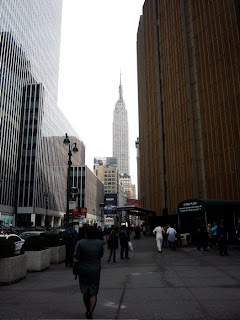Judy Garland Sings Cole Porter's "I Happen to Like New York," and in the City, a Judy Garland Retrospective
(Revised, January 2013) The Cole Porter song "I Happen to Like New York," sung by Judy Garland from the 1963 television special Judy Garland and Her Guests Phil Silvers and Robert Goulet, is a proud, almost defiant New York anthem. A rejoinder to a typical general complaint about the city (as in "I don't like New York'), "I Happen to Like New York" delineates the singer's favorite aspects of the city - the city air, the sights and sounds, and Battery Park, among them, but the song is more about a general love for "this town," "this burg." I love the way Garland, a great actress as well as singer, takes a glance back at the curtain of the skyline before she starts singing. She looks like she's taking one more cue from the sight of the dramatic skyline to bolster her arguments.
The song was originally featured in a Prohibition era musical from 1930, The New Yorkers, with lyrics and music by Cole Porter and book by Herbert Fields. The topical but lightweight story revolves around a socialite's romance with a bootlegger, but most of the songs simply highlight different types of New Yorkers. Vaudeville star Jimmy Durante (1893-1980), a native of the Lower East Side, combined his talents in jazz and comedy for several numbers in the show. A male actor, Oscar Ragland, in the part of Mildew, sang "I Happen to Like New York." The most famous song from the musical, "Love for Sale," sung by a streetwalker character, caused a bit of a scandal for its frank depiction of prostitution. The New Yorkers opened at the new Broadway Theatre on December 8, 1930, playing 168 performances. Monty Woolley (later star of The Man Who Came to Dinner, 1942) directed the musical.
Garland (June 10, 1922 - June 22, 1969) happened to like New York. No stranger to the city, she performed here many times over the course of her career, including a promotion tour with Mickey Rooney for Babes in Arms in 1939 (the year she traveled to Oz) through her final performances at the Palace Theatre in July of 1967. On April 23, 1961, she gave one of the most celebrated concerts in Carnegie Hall history.
Like Durante before her, Garland would make a successful transition to television, although one often fraught with contractual disputes and variable ratings. After settling a lawsuit with CBS involving claims of libel and breach of contract (long story), Garland appeared in two specials in 1962 and a third in March 1963, the one with Silvers and Goulet. The latter served as a preview for The Judy Garland Show, a series that lasted 26 episodes over the 1963-1964 television season.





Amazing to compare Hackensack with New York City...was it chosen for the name, or was it really a place to go, another small city where the downtown has since died...probably the former as the Northeast is riddled with great Indian names just itching to be memorialized in lyrics.
ReplyDeleteHi Penny. Thanks for your comment. I'm guessing that Cole Porter, known for his clever rhymes, simply liked the name of Hackensack, a town in Bergen County in New Jersey. Hackensack rhymes well with "back." I also wonder about his choice for the only place named in the song - Battery Park. Here again, I think that in addition to its usefulness in the song as the place of immigration for new waves of New Yorkers, he simply liked the sound of it.
ReplyDelete